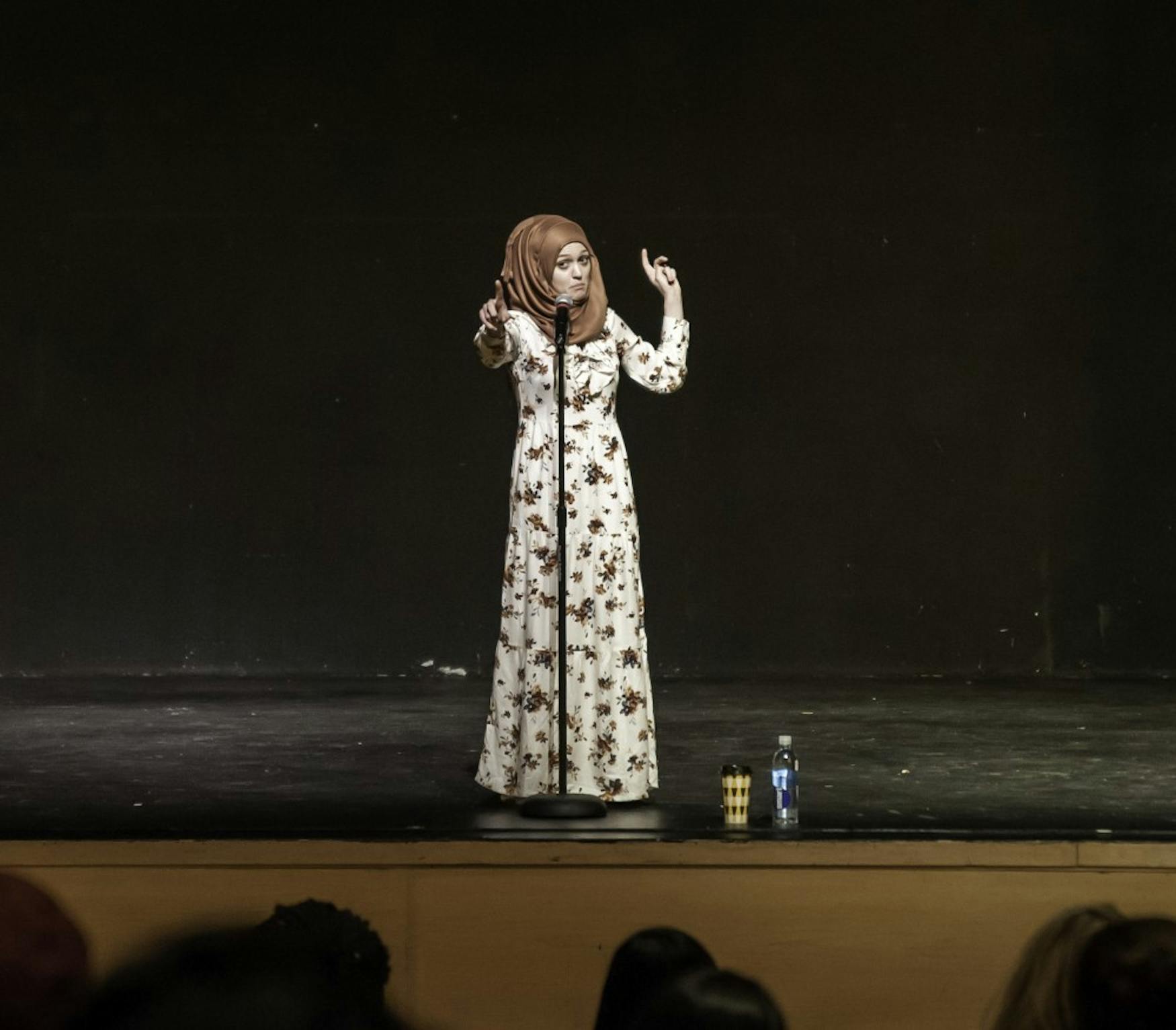Syrian-American artist talks Islamophobia and poetry
“I am Amal and my name means hope,” Syrian storyteller and activist Amal Kassir told an audience on Saturday night, opening her speech on Islamophobia on college campuses and in the world. The spoken word artist described her life as a Syrian-American living in a post-9/11 world on Saturday night, as a part of ’DEIS Impact, the University’s annual social justice festival. Kassir, a recent graduate from the University of Colorado Denver, has performed her poetry across the country and the world, according to the online event description.
“The only thing that qualifies me to be up here is the fact that I’ve written a few poems about it and happen to be a Muslim woman,” Kassir said of the night’s topic, Islamophobia.
To tackle the massive topic of Islamophobia in the world today, Kassir first examined its historical, economic and governmental background. “It’s important to assess things geopolitically,” she said, “before we just go looking at religion.”
According to Kassir, the first time the words ‘Islam’ and ‘terrorism’ were associated with each other was in 1983, when a U.S. embassy in Beirut was bombed. After this attack, the idea of “global terrorism through the religious scope” became prevalent, she said.
Kassir drew attention to the connections between diplomatic and military policies in the Middle East and American business interests. “It always has been business,” she said, explaining these business connections “entailed military equipment, weapons, oil, et cetera.”
She also challenged American perceptions of Islam, reminding the audience that not all Muslims are brown-skinned or Arab, and that, in fact, “the majority of all Muslims come from Indonesia.” According to Kassir, this fact is obscured by a news media that only pays attention to countries which portray Islamic culture as a “society that’s disagreeable.”
The three poems Kassir shared throughout the night rejected that narrative. Her first poem described her white mother bonding with her Syrian grandmother through cooking, despite their different recipes. The second described her grandmother’s garden in Syria, discussing the importance of food as a way of protecting young, starving orphans in the country from being radicalized by the Islamic State group. Her third poem was a playful ode to the struggle of finding a place to get a haircut as a hijabi.
Turning to the human experience of being a Muslim American, Kassir described the way 9/11 redefined the existence of Islam in America. She disparaged “the way in just a few moments, a national tragedy can transform a group of people from mourners into suspects,” and described the immediate aftermath of the tragedy, in which FBI agents visited and raided mosques and created fear and suspicion within Muslim communities.
Kassir referenced a Pew Research Center study which found that anti-Muslim sentiment has not been a direct result of terrorist attacks, but only arose “when politicians got on television,” Kassir said. “That is when Islamophobia started to rise.”
Yet, Kassir made it clear that Muslims are not the first Americans to experience this kind of violent hatred, reminding the audience of the oppression that faced Japanese, Jewish, Irish and Black Americans. Kassir said, “It’s just another trend to the cycle of ‘othering.’”
Kassir has used her voice and social media accounts to spread awareness of the horrors taking place in her father’s homeland, Syria. She told the story of the horror of learning via WhatsApp messages that her aunt’s house had been bombed and everyone in the family except for one person had been killed. Kassir recounted how her father urged her to post about the tragedy on Facebook to spread awareness and how she spoke out about it at the John F. Kennedy Center for the Performing Arts the next day.
Kassir’s message got massive attention online, and Kassir’s family received a flood of cards and donations, part of what she called “the desperation of ‘What Can We Do?’”
Kassir said, “Think of all the casualties that don’t have someone to tell the story, that don’t have a stage to get up on, that don’t have a country where they can tell that story to you.”
Finally, focusing on the root of Islamophobia, Kassir highlighted the disconnect between the way Muslim people are portrayed in the media — usually after terrorist attacks — compared to the realities of Islam and the tragedies Muslims face across the world.
“There are statistics that are far more representative of the Muslim community than the headlines,” Kassir said. “Look at the numbers and look at the tragedies, do not only look at the news.”
Kassir’s performance was a ’DEIS Impact event, co-sponsored by the Muslim Student Association and Social Justice and Diversity Committee of the Student Union Senate.




Please note All comments are eligible for publication in The Justice.